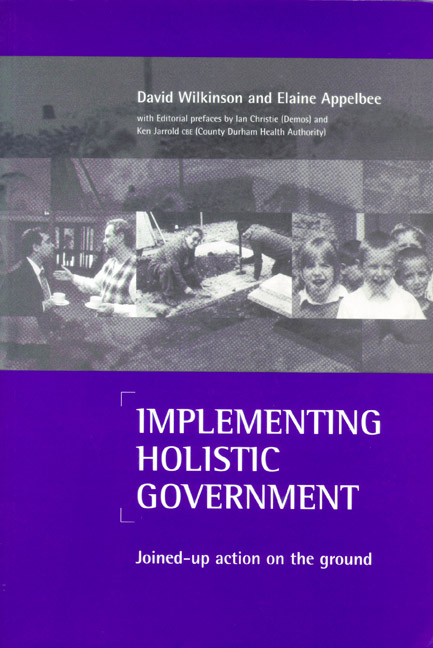Book contents
- Frontmatter
- Contents
- Editorial preface
- Editorial preface
- Acknowledgements
- Summary
- 1 Setting the context
- 2 The functional inheritance and its consequences
- 3 The public service, community interface
- 4 Change that works – sustaining community and quality of life improvement
- 5 Change that works – sustaining organisational and whole system change
- 6 Developing the middle ground: where bottom-up meets top-down (a third way for local governance?)
- 7 Improving sustainable quality of life: the benchmark for Best Value
- 8 Joined-up action on the ground: six key issues that have to be addressed
- 9 Working in the middle ground: recommendations to promote joined-up action on the ground
- References
3 - The public service, community interface
Published online by Cambridge University Press: 05 July 2022
- Frontmatter
- Contents
- Editorial preface
- Editorial preface
- Acknowledgements
- Summary
- 1 Setting the context
- 2 The functional inheritance and its consequences
- 3 The public service, community interface
- 4 Change that works – sustaining community and quality of life improvement
- 5 Change that works – sustaining organisational and whole system change
- 6 Developing the middle ground: where bottom-up meets top-down (a third way for local governance?)
- 7 Improving sustainable quality of life: the benchmark for Best Value
- 8 Joined-up action on the ground: six key issues that have to be addressed
- 9 Working in the middle ground: recommendations to promote joined-up action on the ground
- References
Summary
We have just had our bid to the SRB Challenge Fund approved. Where do we go from here in involving the community? (DoE, 1995, p 5)
Those concerned with democracy and development … should be building a more civic community, but they should lift their sights beyond instant results…. Building social capital will not be easy, but it is the key to making democracy work. (Putnam, 1993, p 185)
This chapter focuses primarily on issues and questions that have arisen during work involving community development and regeneration, particularly the extent to which this is helped or hindered by the work of public service institutions and delivery agencies. It has been these experiences that led to the wider questions asked and issues raised in this report, and provided the stimulus to propose alternative ways forward.
The above quote is taken from an excellent ‘practitioners’ guide’ to regeneration produced by the former Department of the Environment (DoE). But it reflects, probably inadvertently, the ambivalence that surrounds both the nature and status of communities and the reasons for involving them. The assumption in the statement above is that ownership of the bid has been firmly with the institutions, but that there now needs to be some kind of participation. But for what purpose?
The research evidence shows that there are two fundamental requirements for the achievement of sustainable regeneration. Firstly, there needs to be a strengthening of social cohesion to overcome the social fragmentation, isolation and lack of self-esteem that so often exists. This provides the capacity to sustain high levels of involvement built around local agendas. Secondly, mainstream service spending and delivery needs to be attuned to work in partnership, both with each other, and the community, in pursuit of local needs and agendas. In effect, special regeneration monies can provide short-term additional funds to promote and facilitate these developments. But they can just as easily divert attention away from the crucial need to address patterns of, and links between, mainstream spending. These topics are covered more fully in Chapter 4.
It is evident that this research has had some impact upon public policy. There has been increasing stress placed on local consultation and community involvement. Recent government consultation specifically raises the issue of community capacity building (DETR, 1997). However, there seems to be uncertainty about the purpose of this and whether it is little more than extended consultation.
- Type
- Chapter
- Information
- Implementing Holistic GovernmentJoined-Up Action on the Ground, pp. 43 - 56Publisher: Bristol University PressPrint publication year: 1999



